The Modern Farmhouse - why?
I think most trends have deeper meanings. They say something about us culturally. They are symbolic of attitudes and reactions.
To me, the connotations of a farmhouse are - nostalgia for a "simpler life", hard work and self-discipline, close family, a lack of desire for modern conveniences and luxuries, a sense of religious faith, the family working together, salt of the earth, conservative and traditional gender roles.
Of course, these things are all romanticized to the extreme!
And because this style is being placed out of context - iow, most of the modern farmhouses will not actually be working farms - there's also this idea of wanting the fantasy without the reality. I think that is actually a very interesting idea because it relates directly to the influence of the internet where people can be something other than what they really are. They can project only the best of themselves, they can have 'friends' they don't really know, and they can say things online that they would never say in person. Aliases are created because of consequences in their jobs and communities. Although, a strong argument could be made that humans have pretty much always wanted the fantasy without the reality ...
Yet, this style seems to be a reaction against that too. A yearning for an authentic and honest unplugged life ... and maybe a few chickens.
That's my take, lol. What's yours?
Comments (102)
bry911
6 years agolast modified: 6 years agoIf specificity and critical decision-making don't matter, we're left with the McMansions which are everything to everyone...and fail miserably.
The question then becomes, are McMansions a failure? While I hope the answer is yes, I also must admit that I don't get to decide. The way we live today is nothing like the way we lived 100 years ago, the role of our home in our life has changed in ways that people couldn't have predicted 100 years ago. We can't sit here today and predict how those changes will effect our houses 100 years from now. It is possible, although admittedly unlikely, that McMansions will fill some unintended purpose in 100 years and be considered the pinnacle of smart design.
palimpsest
6 years agoI think the problem with the modern McMansion is that they can't withstand neglect and vacancy the way a large house of 100 years of age now can. Of course it's the things that make them efficient that make them rot from the inside out. But they are not going to be able to withstand the collapse of the market for that sort of house the way the original demographic for the large 19th c. house disappeared virtually overnight like it did in my inner city. Fashionable to slum in a decade or so for some neighborhoods. But a modern house will fall down long before they can be reevaluted in 100 years in the absense of occupancy and comprehensive maintenance.
Related Discussions
Help/Input on Modern Farmhouse floorplan + exterior
Q
Comments (27)Thanks Summit! Yes... I originally wanted that hallway there... but we were open to "conserving space" (to try to keep the house at/around 4000sf) if the architect had different ideas. I think he did a good job getting in what we need... but..... I feel like I want that hallway regardless of how much/little SF it adds to the house. I still feel like the laundry/craft room + mudroom + back pool bathroom needs reconfiguring still. Would a hall going from that back door connecting to the hall from the guest room (so the bathroom opens up into that hall) work? Or maybe move the laundry room down so its accessible from the guest hallway vs teh back corner. Hmm....See MoreModern farmhouse exterior
Q
Comments (42)@ Res, You can gut and re do a master bath in ten weeks well planned, a kitchen in 12. I've had a fabric on order for two chairs since SEPTEMBER. They'll be at my upholsterer another three after that, and that's with pretty please and sugar on top. Client is hanging in, and won't consider a change. Their rug, ordered in August and back ordered, was just finished, after finally arriving a week ago. A half decent custom sofa takes 12 to 14 weeks minimum. ....................so maybe just count your blessings. The profit from any of this is just as "delayed" : )Pretty damn hard to invoice in full, that which is not THERE....See MoreWhich interior door style to go with for a modern farmhouse?
Q
Comments (26)A very important feature of flat paneled doors is the sticking (the little strips around the perimeter of the flat panels). I believe the doors you are considering are of molded composite construction from Jeld Wen and have no sticking other than a slight bevel on the stiles and rails which Jeld Wen calls "Craftsman sticking". Of course, the real reason for the slight bevel is the inability of moulded door stiles and rails to be fabricated with sharp edges. IMO these doors are a step down from traditional flat panel doors with or without sticking but perhaps that's appropriate for a "modern farmhouse". No one could argue otherwise since its a style based on vague notions of older rural vernacular architecture and these doors have that same vague undefined casual quality. I don't mean that as a criticism. With a trade discount at Home Depot these doors are a bargain and I've used them when TruStile doors were over the budget. Some examples of traditional sticking designs:...See MoreUsing white, farmhouse style windows in non-farmhouse?
Q
Comments (37)Traditional ? you mean true divided windows where each piece of glass was installed between wood muntins? I can't imagine you could even buy a window like that...maybe at a salvage shop. My experience is with Anderson 400 which offers is the look of true divided windows, are energy efficient, and avoids the snap in/snap out vinyl grids, that break and leave holes in the window frame. K H, tell your husband to take a look...he needs an introduction to muntins in modern age. He won't freeze with these. My neighbor mowed his lawn last evening while we were having guests for dinner. I shut the windows, closed the slider (Anderson as well) and it was like turning off the t v....See Morezippity1
6 years agoi live in a"farmish looking house"...less than 5 years old on 4 acres in a large subdivision. Once i get past the white paint and porches the difference i see in my house and others built at the same time is that mine has windows all the way around...not front and back and a little one on the side....hence i'm not looking at the side of another home (as i would be in town/city) i am hopefully looking at fields and pastures waiting for a breeze to come in....i could say more as i chose this plan 22 years ago, but i'll just stop here.
taconichills
6 years agolast modified: 6 years agoIn a few years, the "modern farmhouse" will become the latest nehru jacket that no one wants anymore.
Thank you cpartist.
beckysharp Reinstate SW Unconditionally
6 years agoI prefer Holly's comparison, from another thread, to a goldendoodle rather than a Nehru jacket, which is/was an actual item, popular for a time outside its usual confines. As Holly wrote,
New theory: The "modern farmhouse" is the labradoodle of architecture. An often unfortunate blend of two things that are fine on their own, but when combined create an unpredictable mishmash that runs the gamut from acceptable to incredibly aggravating. While there are poor examples of both types of the parents, they are at least recognizable for what they are. Owners of them fail to understand that what they have lacks the consistency and established standard of either and often get quite offended. Both are also frequently subjected to further degradations into things like goldendoodles, doodle-doodles, dane-oodles, and "modern coastal farmhouses."
cpartist
6 years agoWe can't sit here today and predict how those changes will effect our houses 100 years from now. It is possible, although admittedly unlikely, that McMansions will fill some unintended purpose in 100 years and be considered the pinnacle of smart design.
Yes the McMansion may find some use and be considered the pinnacle of smart design IF they weren't built so shoddily.
Daisy
6 years agoIf I said I want to build a bungalow would everyone know what I'm talking about? Is that an architectural style?
palimpsest
6 years agoI would say with regional variations, yes, if you asked someone who knew something about design to build you a bungalow, they would come up with something that met a fairly recognizable shortlist of criteria for a bungalow in your region.
Virgil Carter Fine Art
6 years agolast modified: 6 years agoHere's a modern Texas farmhouse, vintage 1865. Pretty sure these folks appreciated their modern conveniences and shelter from some of the weather, some of the time.
Here's the issue in a nutshell: what's modern to a given family and generation may have little meaning to others of a different family and generation.
This is why specificity always trumps generality...or a shrug of the shoulders.

PS: Can you find the children?bry911
6 years agoHere's a modern Texas farmhouse, vintage 1865.
I am confused... I thought you were arguing for specificity, but then you go and provide the best argument for generality. The question above isn't whether or not we would consider the structure modern 150 years later, the question is whether or not they could have communicated their desire for the noted conveniences in their day.
We know that Richard Braithwaite used the term computer in 1613 to describe a person who did calculations, we also know that the word caught on and was widely used for hundreds of years to describe people and not magic boxes that allow us to find pictures of old farmhouses. Does that those people misused the word for hundreds of years simply because in the last 50 it has come to mean something else?
Even the words "1865 modern farmhouse" is more useful than "1865 farmhouse". The former gives us real insight into the state of innovation in 1865 and what passed for modern, while the latter just says someone built a house. For example, let's look at these two rustic Idaho homes built about the same time and note how future generations might benefit from the words "simple home 2009" vs. "modern home 2009"
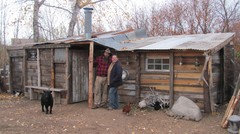

palimpsest
6 years agolast modified: 6 years agoI don't think the term "Modern Farmhouse" can necessarily be made more specific than "McMansion" at this point. At some point in the future there may be a way to categorize them more specifically.
But I think for the time being they are generically evocative. You could post many different expressions of McMansion but if you posted 50 different McMansions, I think they would be recognized as such for the most part (with arguments about relative tastefulness I suppose). So likewise I think several dozen examples of Modern Farmhouse could be posted and they would all be recognized as such.
Right now it does not work so well the other way 'round: While we can each present a McMansion that's different and have others recognize it when we see it, we could not do an exercise where we each drew a McMansion and end up with the same house, or walk into an architect's office and say "Design me a McMansion" and get a specific style of house.
Virgil Carter Fine Art
6 years agoBob looked at me and shrugged his shoulders...Bob doesn't get this conversation. Neither do I. Bob thinks the two photos above have nothing to do with farmhouses--modern or anything else--or anything in this thread. I have to agree with Bob.
Looks like we may be entering the stage of an extended thread where we simply want to upstage a previous comment, rather than stick to the "modern farmhouse" and what does it mean topic.
But I could be wrong. Bob tells me that all the time...
I'm going out to the garage and taking my Porsche around the block for therapy. Bob is coming with me...
bry911
6 years agolast modified: 6 years agoBob thinks the two photos above have nothing to do with farmhouses--modern or anything else--or anything in this thread. I have to agree with Bob.
I might be alone in this, but I really find the whole imaginary friend thing to be less than appealing (I am trying to be polite). Say what you want to say, own it as your own, the whole, "I have a friend who says..." just makes it harder to address you in a comment.
Virgil Carter Fine Art
6 years agoWhat is a "modern farmhouse"? So far no one has tried to define or illustrate it. The conversation, so far, has been about semantics, cultural meanings, nostalgia, simplicity and the like. Fortunately, no one has yet brought up the guru of all well designed things--HGTV...who is probably the source for many of the images people may have about "modern farmhouse"
Well...OK! Here's a pictoral summary of a wonderful "modern farmhouse". It's a project by Wyant Associates which honors an legitimately historic Pennsylvania farmhouse (late 1700s, I'm guessing), with a "modern" and respectful addition, merging a historical creation and an addition of its time in a wonderful combination, where each element is an honest expression of its time, and the total composition is harmonious and pleasing.
The point of this is that "modern farmhouse" is such a generic and elastic term as to have all meanings and no meanings. Was this an image that came to your mind for the term "modern farmhouse"?
The architects and the owner obviously drew from the vocabulary of the existing home, so typical of historic Pennsylvania farm houses using the readily available field stone common throughout much of Pennsylvania, and used simple shapes, forms and materials in a "modern" way for the addition. The result is a custom home which blends old and new, outside and inside in a most creative and harmonious manner.
This is truly a "modern farmhouse", but perhaps not the initial vision one might have of the term. This is what strong architectural design is about--finding creative solutions for living which make life better.


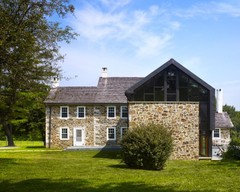



User
6 years agolast modified: 6 years agoLet’s define a farm, and a “modern farm” before we define a farm house, or a MF. Because how anyone can have a farmhouse on a .1 acre lot in an urban environment is beyond me. Unless the basement is full of hydroponics and grow lights for a lucrative cash crop. And there IS s long tradition of city residences above the store.
So, where’s the “modern barn” that houses the cows in winter? The “modern pigpen” that you fatten the hogs for your winter hams? Where is the “modern smokehouse” where those hams are hung? There does seem to be a surprisingly allowed hipster trend to “modern chicken coop”. But no equivalent “modern manure pile” to go with the producer of said manure that no real farmer would ever treat as an actual waste product that needed disposal.
Can you have a farm house without a farm? Isn’t just any house built on a farm a “farmhouse”?
Why don’t people have the guts to admit that the modern interior volumes which have dominated late 20th century early 21st Century architecture are finally finding some external expression of that volume that people find acceptable by veneering it in an archaic agricultural terminology so as to still not confront the term Modern in its whole. For some reason, people mentally associate Modern with Cold, Unfriendly, Foreign, and Ugly.
Adding that Farmhouse noun and using Modern as the adjective uses the archetype of the Frontier Little House on the Prarie that never was quite that luxurious and romantic. It does get people past that weird mental block and well into Modernism, The Next Chapter. Which is the heart of the central Idea.
New American Modernism might be a more apt term, Because the architectural purists and the masses both would find that acceptable as a term that would describe the spirit and the forms that the idea has been expressed in.
And, it’s got American in it. Woohoo! Parades and hot dogs and apple pie. But, its not just a Big White House. It also uses other materials and forms. But it is definitely echoing back more to Modernism than any other school. Simpler forms. Minimalism. Function as form as the first. It has less of a Mr. Potatohead architecture to it than does the NeoEclectic school of one from every category on the menu. In the midst of sapiens sapiens evolving sapiens neanderthalensis probably couldn’t articulate why they were that different either.
User
6 years agoI grew up in farming communities in Oklahoma/Kansas. Farm houses were usually bare minimum structures, necessary for cooking/sleeping. They usually had a formal parlor if the farmer was sufficiently wealthy. Farm buildings were more important, barn, tool/equipment protection, livestock care and grain/silage storage were much more necessary.
Our first house was originally a farm house. Square box, four rooms. The largest room of the four was the kitchen. Built in 1896 on a native stone foundation. Someone added a front porch later.
As a decorative genre, farmhouse style is basically whatever the designer says it is. There is no definitive farmhouse style. The only one I can think of is a converted barn---but that would be barnhouse style.
nirvanaav
6 years ago"I think it was only at the end of modernism that residential architecture that was popular with the masses started to completely lose its way or its focus."
There is a common premise that post WWII residential architecture is something to be derided in general. However, what is not understood are the technological and social catalysts that produced the new styles. Asymetrical facades, open floor plans and attached garages were not some evil concoction ginned up by "builders"; They reflect the lifestyle changes in the latter part of the 20th century and the technology that enabled building residential structures unlike any before.
If there is a failing, it is the failing of architects of the latter part of the 20th century, even through the present to incorporate these social changes and technological advances into styling that adheres only to the fundamentals of good design, without an insistence for recreating the past. The McMansion became what it is not because of its size, its square footprint, its three and four-car attached garage, but because it was made to look like architectural styles of the past. A new architectural "language" was needed for the realities of large square footage demands built on postage stamp-sized lots.palimpsest
6 years agoIt's not the plan that was the problem for many postwar decades, it was the often ill-proportioned "symbolic" facades that were tacked on to modern plans to make them more palatable to people who wanted a modern house without the modernist appearance. One of my friends calls these terditional.
Now of course convoluted floor plans and ill-proportioned towering ceiling heights abound as well.
It's possible to design a traditional looking house with a modern plan or a gigantic house on a tiny lot, but it just doesn't happen commonly.
bry911
6 years agolast modified: 6 years agoWhat is a "modern farmhouse"? So far no one has tried to define or illustrate it.
From my post above:
Modern farmhouse is a perfectly valid set of descriptors. I agree that it gets used incorrectly a lot, but the two words are self explanatory. It is the marriage of contemporary architecture and traditional farmhouse architecture, and please note that even [American] farmhouse architecture didn't start as an architectural movement. It was simply an economical design developed as a way to separate the work areas of a home from the living areas of a home so one could be heated at night and one could be heated during the day.
I see modern farmhouse as taking the practical designs of farmhouse and adding a lot of light. Instead of "work areas" being separated off for heat, I see them separated off for light. Large window walls that dominate the public areas of the house, no mouldings, industrial interiors, etc.
Adam Thomas
6 years agoGreat topic, lively discussion!
My wife and I are building a home on 7 acres in southern Alabama. Our driveway will be nearly 1000 feet long (and wraps around a couple ponds) and the home will not be viewable from the road. We wanted a home that was reminiscent of the history of our area and yet functional for us. I would imagine that the first time we met with our home designer we said something dumb like "modern farmhouse". Luckily, our designer threw away all of the horrid drawings I made for him and had us start back at the beginning.
We ended up with a set of plans that we love and a whole bunch of columns and porches.
I can envision a day, 35 years from now, when the live oaks that line the driveway will be grown in nicely (covered in Spanish moss of course), grandkids catching catfish in the pond out front, the wife and I sitting on the front porch drinking ice cold sweet tea (so much sugar the spoon will stand up in it), when some redneck rolls up in a beat up old pickup and says "I see you folks got swept up in the modern farmhouse craze of 2017". I'll get maw to use the business end of her double barreled shotgun to point him towards this thread.

cpartist
6 years agoSorry Adam, that does not look like a modern farmhouse to me. However whatever you call it, it will be beautiful and I'm looking forward to seeing your progress.
B Carey
6 years agoI think bry has the closest description. As the movement is still evolving, I would think it is still too early to fully define. BUT I would say that the homes people build and describe as modern farmhouse would not be defined by this forum as a different already established architectural style. While I think Adam’s house looks quite different from many of the other modern farmhouses, what other architectural style attaches a garage that resembles a barn? Not very many older farmhouses have attached garages. Even if there is a specific description of a modern farmhouse and some of them fall outside that, then they could be a colonial modern farmhouse or modern farmhouse cottage.
For Sophies comment, I would say that people are building ‘modern chicken coops’ ‘modern pigpens’ ‘Modern barns’ Etc. We tore down our family barn and plan to put it back up on our new property. It will not be for my cows, but for a bar, TV lounge area, pool table, basically a fun entertainment building. A friend who lived a county mile from my last acreage did the same thing (after seeing how we transformed a building we had!). Go on Pinterest and find chicken coops that have chandeliers and photos (and actually house chickens!). People are building elaborate obstacle courses for their goats. Fancy Trellises for grapes. No need to build a modern pigpen when the pig lives in the main house...lol.
Adam Thomas
6 years agoThank you cpartist. It doesn't look like a modern farmhouse to me either. I learned a lot in this thread but what will stick with me is that the term is almost meaningless because it means vastly different things to different people.
My tongue-in-cheek comment above was my odd way of saying that I image the phrase "modern farmhouse" will soon be tossed until the trashpile of history.
Virgil Carter Fine Art
6 years agolast modified: 6 years agoWhat makes the term "modern farmhouse" so challenging, and ultimately meaningless, is that there is no commonly accepted and understood definition. That's because it's not really an architectural style at all, such as Colonial, Federal, Gothic, Shingle, et al. These true architectural styles each share their own defined individual and applicable elements of style, which distinguishes them from other styles and gives us all a strong common understanding and vocabulary of a given style, for instance, Colonial Revival.
Farmhouses, on the other hand, have always been differentiated by regional characteristics, i.e., the commonly available and used materials; the commonly available labor and techniques for building; the differentiating effects of climate, etc. A farmhouse in New England may look nothing like a farmhouse in the Mid-Atlantic, South, Southwest or Mid-west. Thus, there are virtually no common characteristics of farmhouses; only common regional characteristics which vary region to region.
Perhaps the most commonly shared characteristics of some early farm houses is that of Folk House--houses build in a common vernacular in various regions of the country, using pre-cut lumber, distributed by the railroads. Folk houses were not limited to farmhouses, but were built and rebuilt in a variety of locations over an extended period beginning in the late 1800s. Some sources, such as the McAlester's "Field Guide to American Houses", call this style the "National Folk House".
And as for the term "modern" there is even less agreement as to what it may mean. For many, the recognized Modern or International Style is not what is meant at all. In fact, many people aren't even aware of what the Modern or International Style is. For many people, "modern" simply means "of our time"; often the term is considered similar to "contemporary". Hence the predictable confusion between those familiar with and knowledgable of recognized architectural styles and those who use the term "modern" in a generic or aspirational perspective.
So...What we are left with is a general understanding that "modern farmhouse" is not an architectural style at all; it's a generic and elastic term which is most often meant as an aspirational description by an individual, using the individual's own semantics and perceptions. We simply have to recognize that one person's semantics and perceptions may not be that of another person.
Nothing at all wrong with any of this. After all we are all individuals with our own individual experiences and aspirations. And isn't that a wonderful thing?
bry911
6 years agolast modified: 6 years agoWhat makes the term "modern farmhouse" so challenging, and ultimately meaningless, is that there is no commonly accepted and understood definition.
Yes there is! Neither word, "modern" or "farmhouse," are terribly hard to define, like many words, the definition of each is a bit broad, but no more broad than many words easily understood by even the least educated in our society.
The problem being, you are advocating tossing out the usefulness of a set of words because you don't think they are sufficiently descriptive, but they are, they are just not a proper name. Yet, they are still evocative. If someone walks into your office and says they want a modern farmhouse you will have some follow up questions, but yet you still will have eliminated A LOT of other possible styles. Most of us will actually visualize our idea of a modern farmhouse, and that is a great starting point for design.
Again, to go back to my sports car example, were I to walk into a car dealership that has several brands and note that I am looking for a sports car, the salesman will probably have some follow up questions, however, it is still useful as it saves him the time and trouble of showing me SUV's. I bet you right now, that there is a car enthusiast on some auto forum giving someone else the third degree because, "there is no such thing as a sports car!"
I think it fairly safe to say that you will not draw either an 1865 farmhouse or a Queen Anne, were a client asking for a modern farmhouse. So while the two descriptors might not adhere to Architect nomenclature, it is very far from useless.
User
6 years agoIt may be far from useless, but it's far from specific enough to describe an actual architectural style. When people say they like a Modern Farmhouse, my first instinct is to ask if they are growing cotton or soybeans. That's the two big crops here in the top part of the Delta. But, I usually restrain myself, because they aren't using it so much as a descriptive phrase of either an architectural style, or a decor style.
They are using it in an emotional way, because the phrase elicits an emotional response. That, and the fact that it triggers those emotions without being too specific, lets you know that this was some marketer's dream campaign.
You can say that you want a red convertible too. And that would be a Ferrari on the track at Monza to some, or a Rose parade ready 58 Cadillac. Yes, it's a start, but where you end up is vastly different!
Virgil Carter Fine Art
6 years agobry911, you apparently don't understand what I am saying.
The descriptor "modern farmhouse" is not useless. It's simply meaningless.
There simply is no such thing as a recognized architectural style as "modern farmhouse", and no style characteristics which are immediately recognizable and commonly understood by a broad spectrum of persons when it comes to the term "modern farmhouse".
You can't create a universally accepted definition and no one else can either. Modern farmhouse is not a recognized architectural style. It simply isn't. It's a personal interpretation and aspiration. Which is fine.
If you came into my office and said I'm interested in a Colonial Revival style house, we would immediately be on a common ground of discussion and exploration. We could begin with a common understanding and vocabulary.
If you came into my office and said I'm interested in a "modern farmhouse", (repeating my previous comment far above), I'd say to you, "I think I know what a "modern farmhouse" is, but why don't you tell me what you think it is...!
We would have to spend time and money finding a common architectural vocabulary and stylistic preferences. Which is fine, because it's what architects do all the time.
But no one can simply walk into an architect's office (or an office of a designer, drafter, CAD operator or builder's office), and order up a modern farmhouse burger.
No one will know what you are talking about. When two people walk up to the counter and order a modern farmhouse burger, no one knows whether they want mustard, ketchup or mayonnaise. Pickles or onions? Tabasco?
I love the term "modern farmhouse"--it's so charming and romantic. Face it: It's not an architectural style. No one knows what it means.
“When I use a word,” Humpty Dumpty said, in rather a scornful tone, “it means just what I choose it to mean—neither more nor less.” “The question is,” said Alice, “whether you can make words mean so many different things.” “The question is,” said Humpty Dumpty, “which is to be master—that's all.”
bry911
6 years agolast modified: 6 years agoI actually posted something about how the architects you recommended actually said the words modern farmhouse to me, but I deleted that, for this.
What kind of clients did you actually get? I have built a couple of houses and I don't know what colonial revival is. Not only that, I could not care any less, I actually Googled colonial revival, it came up with images and the nuances were not immediately visually apparent to me, so I just closed the window and asked myself, "do I care?". The answer is I didn't care before you named it, and I don't now. I can't imagine that most people walk into an architects office and start the process off by using the correct nomenclature and boom you both are on the same page.
As an accountant, when non-accountants walk into my office and they start throwing around accounting lingo, it is almost always wrong. I cringe when I hear someone talking about their property depreciating. It is good to know that so many people can actually put a name to their home desires, I am sure your job is a lot easier than mine then.
However, if the lion's share of people don't know the proper name of the architectural style they are looking for then what good is some odd adherence to naming architectural styles?
Mark Bischak, Architect
6 years agoA potential client called me and said, "I want a Victorian house!", and I replied, "Which flavor?"
Labels applied to architecture many times have broad definitions. I have seen the Gamble House classified as Craftsman, Prairie, Art Nouveau, Oriental, and Art Deco. "Modern Farmhouse" is the current blanket.
Oaktown
6 years ago"Modern farmhouse" might not be an architectural form but it is still a thing :-) People who think "modern farmhouse" is not an architectural style (myself included) would still agree that it is an interior design/decorating theme, yes? I've seen a lot of threads on GW re decor being appropriate to a house, why not the other way around? I've also seen a lot of threads on GW re having an organizing theme/overall idea, can't "modern farmhouse" serve that purpose?
Our house is supposed to be "lowcountry inspired" but nearly everyone (architects, builder, visitors, etc.) calls it "modern farmhouse" so I decided to roll with it.
Adam Thomas, I am curious, are those extended gables? Kind of like in this photo?
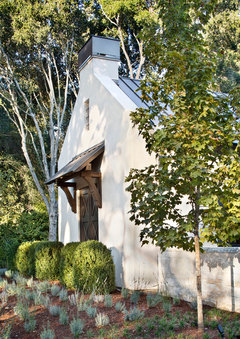
taconichills
6 years agobry911, you just ran intellectual circles around Virgil. I read his posts and scratch my head with the silliness written, then I remember he is too busy talking to bob in some fantasy world.
Being a pro on a premiere home forum and claiming a cluelessness about the modern farmhouse makes people wonder. You are unhappy about something, just strange that you would go to such lengths to delegitimize something.
If I google Cape cod, I get hundreds of distinctively recognizable images.
If I google Tudor, I get hundreds of distinctively recognizable images.
If I google Vicotorian, I get hundreds of distinctively recognizable images.
If I google Greek Revival, I get hundreds of distinctively recognizable images.
If I google Mediterranean, I get hundreds of distinctively recognizable images.
If I google Modern Farmhouse, I get hundreds of distinctively recognizable images, and they don't look anything like the first five searches of the other home types.
jmm1837
6 years agoInteresting discussion - but I wonder if "farmhouse," whether modern or not, can ever really be an architectural description of a "style" rather than simply a description of a purpose. I've lived in a whole lot of places, and what is a farmhouse in New England is very different from a farmhouse in BC, where I grew up, or Australia, where I live now, never mind Italy or Greece or Eastern Europe. And how about Southern African rondavels? All the genuine farm houses I've ever seen were basic houses, based on the local architectural concepts, but adapted to the needs of a farm and the vicissitudes of the local climate.
When someone talks about Georgian, or Colonial, or Tuscan or Tudor, there are strong distinguishing architectural features regardless of where one lives. Farmhouses, not so much.
I'll offer up an example from another idiom: where I grew up, on Vancouver Island, there is an old mining town with a lot of cottages built for the miners. The mines are gone, but the cottages, little wooden clapboard houses, are still there.
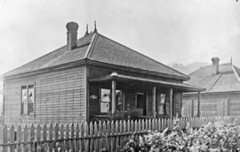
The first time I visited relatives in England, they took me to a friend who lived in an old miner's cottage across the street from them.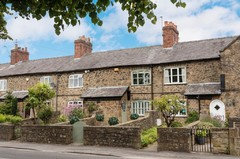
These are both genuine miner's cottages, and of a similar vintage, but there the resemblance ends. You can't design a "modern miner's cottage" without understanding what the term means to an individual, because your Canadian and your Englishman will have very different concepts.
Similarly, the farmhouses on the Island don't look much like any of the examples Virgil posted. Typical Vancouver Island farmhouse:

I spent some time in Ukraine:

And now I live in Australia, where the farmhouse is different again:
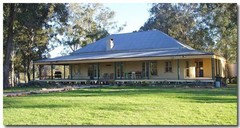
So what does "miner's cottage" or "farmhouse" really mean? When I google "modern farmhouse" I seem to get a lot of fairly standard structural designs with a bit of dressing on the side - some vertical siding here, a front porch with a couple of pillars there, a barn door somewhere, but there's nothing very unique about the actual shape and structure of the house.
It reminds me of the 70s fake Tudors - ordinary raised ranches with a few bits of wood trim do not a Tudor make. Back in the 20s, they had some sense of the roofs, chimneys and structure that made a mock tudor; in the 70s, it was all cheap dressing on the front of standard houses.
I see a lot of the "modern farmhouse" craze in the same light. It's meaningless as an architectural term because it describes anything the user wants it to be. A bit of vertical siding and a front porch on a bog standard design, and suddenly it's a "farmhouse." Right.
And that's where it differs from the "sports car" analogy, because with all the variety in sports cars, everyone understands that they're generically two seaters, possibly with a ragtop, definitely with a high power to weight ratio, totally impractical for normal use, but great fun to drive. They share that common heritage. Mazda MX 5 or Lamborghini, they have a certain ethos about them even if one is a lower end car and the other an exotic.
Farmhouses don't have that commonality. They were designed for a different climates, conditions and materials: most farm houses are reflections of the culture in which they emerged. So, in one place you see a stone version of a colonial, in another, a wood version of a Victorian, somewhere else, and thatched cottage. Farmhouses, the real ones, are workhorses, not prancing show ponies, and a lot of modern farmhouses seem to me to be simply pastiches of the real thing.
bry911
6 years agolast modified: 6 years agojmm1837
You are confusing the limits of labels with the limits of language. Lots of words have different meanings in different geographic locations and some proper names for things widely accepted in English are worthless in others areas.
Had I walked into my architect's office in Dubai and said I want a alfidralia style home, I suspect he would stare blankly, even though Federalist style is a reasonably acceptable term in America. Therefore, there is no such thing as Federalist architecture, we should stop saying it.
-------------
The same goes for most labels, sports car is a meaningless term in China. They don't consider high performance cars sporty...
--------------
Finally, and most importantly, the question becomes is the term still valid if it means different things in different areas. That might limit its acceptance as an official architectural style, but not its usefulness to architects everywhere.
Using my working definition as the marriage of traditional farmhouse architecture with that of contemporary architecture might mean that a modern farmhouse in Australia is different than the modern farmhouse in America yet still part of the same movement.
I thought the entire idea of modern farmhouse was a modernist take on traditional regional farm homes. A way to move contemporary designs into the countryside while being a little less "in your face" about it.
So an English modern farmhouse might look like this

While an American might look like this

They can still be part of the same movement.
taconichills
6 years agoFarmhouse- varied by region to fulfill the role of the folks and families when things were more agricultural.
MODERN farmhouse- encapsulates whatever differences there were regionally and morphed them into what is now NOT a regional thing. It is now beautiful, useful, and just as functional as all those who started out with the early farmhouses but with all the luxuries. I salute and admire all the farmers who have done some of the most important work for our country.
Virgil Carter Fine Art
6 years agoNot much more to be said in this thread, unfortunately, because it has degenerated into personal attacks and arguments. It's been a good thread, with good sharing of insights and points of view (including differing perspectives).
When the discussion becomes argumentative, and critical of personalities and their experience, it's clearly time to call it quits.
Thanks to the OP for starting this discussion and encouraging a wide sharing of views and experiences.
Adam Thomas
6 years agolast modified: 6 years agoOaktown: Yes, extended gables. Good eye.
This is a view of the left side of the home.
If you want to see more photos and helpful discussion, here is a link to when I posted our plan on this forum a few months back: [link[(https://www.houzz.com/discussions/houzz-home-building-forum-our-experience-dsvw-vd~4826192)beckysharp Reinstate SW Unconditionally
6 years agoTherefore, there is no such thing as Federalist architecture, we should stop saying it.
Technically, yes. It's Federal style (furniture etc), Federal architecture. Not Federalist (or alternately federalist).
nirvanaav
6 years agoPoints have been made about whether a style is just stuck on parts or whether it is fundamental to a structure. It seems that massing, roof and fenestration are extremely durable parts of a house. All else can be changed at the whim of the next owner. A strong style should be defined by only the massing, roof and fenestration. However, many (not all) long-established, historical styles fall down to this test. It seems that a style is not completely defined without the "doodads" (technical, architectural term).
nirvanaav
6 years agobeckysharp, is correct. Without doodads, Federalist never separates from Georgian. However, there are instances where roof pitch and window width can separate Federalist from Georgia.
bry911
6 years agolast modified: 6 years agoTechnically, yes. It's Federal style (furniture etc), Federal architecture. Not Federalist (or alternately federalist).
Seriously? Do you think taking the "ist" off the word changes the point? Again, it isn't that you are incorrect, it is exactly the problem that you, Virgil and a few others seem to be having. Federalist doesn't exist because the architectural elites know it is Federal... I am not trying to be disrespectful but I am trying to get across the value of labels and their ability to convey sense, emotion, visualization, etc. isn't limited to only proper use of the term.
-----------------
I think the problem that many people here are having is a "purist" problem. The idea that when talking architecture one should only use the proper names and shouldn't use widely accepted, yet broad and somewhat undefined terms even if they do have value.
For a completely unrelated yet pertinent example, have you ever had anyone tell you that a new car depreciates 30% the day you drive it off the lot? Well it doesn't. Depreciation is a rational allocation of an asset's cost over its productive life. It has nothing to do with fair value at all. There is no rational allocation method that will depreciate a car more for driving it off the lot than it will for pulling it out of your driveway. Most of the population misuses the word depreciation, yet that doesn't mean that word doesn't work just because it is wrong. It does, it is very effective at communicating their meaning while simultaneously annoying the crap out of me.
While modern farmhouse might annoy the crap out of architectural purists, it is still effective as a communicative tool.
beckysharp Reinstate SW Unconditionally
6 years agoI am trying to get across the value of labels and their ability to convey sense, emotion, visualization, etc. isn't limited to only proper use of the term.
I can't speak for anyone else in this thread. But as someone who has earned a living writing and editing, often in the field of history, for more than 35 years, I have come to appreciate and rely on the careful use and meaning of words which, to borrow a term, are not mere doodads (trivial ornaments). That careful use has seemed to aid communication.
I'm reminded of a passage from a recent NY Times review of Tom Nichol's book, "The Death of Expertise: The Campaign Against Established Knowledge and Why It Matters":
“ 'Americans have reached a point where ignorance ... is an actual virtue,' the scholar Tom Nichols writes in his timely new book, The Death of Expertise. 'To reject the advice of experts is to assert autonomy, a way for Americans to insulate their increasingly fragile egos from ever being told they’re wrong about anything. It is a new Declaration of Independence: No longer do we hold these truths to be self-evident, we hold all truths to be self-evident, even the ones that aren’t true. All things are knowable and every opinion on any subject is as good as any other.' "
One's mileage obviously varies.
Oaktown
6 years agoAdam Thomas, I've been curious for a while as to the form/function of Cape Dutch gables. I haven't found much so if you know where to get "the story" please share?
For the thread generally here are some photos describing similar forms as "Cape Farmhouse Vernacular."
http://www.architectcapetown.co.za/SOUTH-AFRICA/vernacular/other-architects/04-style.html
gardengal48 (PNW Z8/9)
6 years agoLet's all beat the dead horse a bit more......... :-))
FWIW, Becky's last comment is the most meaningful and relevant post in this entire thread!!
bry911
6 years agolast modified: 6 years agoI collect abstract nudes. I usually commission about half a dozen pieces a year. I never give the artist details of what I want, I just say I prefer it to not be easily distinguished as a nude. I never give any other input, exactly because of the Death of Expertise comment. I don't want the best painting I could do, I want the artists interpretation of that.
This is the exact opposite of The Death of Expertise, it is the fact that I don't know how to describe what may come of setting the artist free and trusting in him to develop something, it means I am not willing to subjugate his expertise to my limited understanding.
The Death of Expertise isn't about knowing the right words, it is about recognizing that there is value in not being an expert and admitting you are not an expert. However, the experts still have to be willing to accept that limit also.
-----------------
Graves, one of the architects who started the whole idea said it was about innovate from tradition, which I think is an apt description.
If I say to an architect, I want a contemporary house that is influenced by the traditional farmhouses in the surrounding area. Suppose we then discuss what I want for size and rooms and then set him free, to let his expertise design something that I couldn't. Isn't that better than walking in and saying I want a "Colonial Revival" home, because I, who haven't studied architecture, should tell you, who have studied architecture, exactly what I want you to do.
---------------
The tragedy here is that you are using the entire point of The Death of Expertise exactly backwards! You are using it to defend the idea that people who know a little bit (the proper name to a house style) replacing the expertise of people who are actually educated in home design. If anything Dr. Nichols would strongly advocate for using the improper words and letting the architect use his expertise to develop the home.
----------------
ETA: Maybe I completely missed the point as I am too entrenched in my own circumstances. But much of this thread seems to be a different flavor of the "I am better than you, because...."
bry911
6 years ago@ Virgil
While I disagree with some of the things you have said. I haven't intended anything as a personal attack in any way. I respect you and your opinion, so if you read any of my contributions to this thread as an attack on you, I can assure you that they were not intended that way.
I sincerely apologize for any inability to make that clear in earlier posts.
beckysharp Reinstate SW Unconditionally
6 years agoLike Virgil, I can't see the benefit of continuing to ride the "modern farmhouse" whirligig. It's been an interesting discussion, but there doesn't seem to be any way to bridge the gulf between the two camps, and I'd prefer to use my time to help complete our new house on the farm which needless to say, though a modern (not Modern) farm house, is not a "modern farmhouse". So best wishes to all who continue on the carousel : ) .
Adam Thomas
6 years agoOaktown. Thank you very much for the link! I have forwarded it to my wife as well.
Sorry I can't provide more information on Cape Dutch Gables. Until yesterday I was calling them parapets. I don't know anything about architecture or design. I come here to soak up the conversations. I lurk 99% and only contribute to a conversation occasionally. In this case, I was just observing that while my wife and I originally wanted a "modern farmhouse", what we really wanted was porches and columns. Our designer figured out what we wanted in spite of our limited vocabulary.
I enjoyed rereading my old thread this morning and remembering that it was described by one poster as a Victorian Train station. Whatever you want to call it, we hope to call it home in late 2018.
Oaktown
6 years agoAdam Thomas, I think they *are* parapet gables. "Parapet" doesn't immediately come to mind for me because I associate parapets with defensive fortifications (e.g. on castles) or walls to keep people from falling off terraces or roofs. When I asked an architect friend about the gable form she mentioned that people also used to use these on city building roofs to help prevent/slow the spread of fires. Apparently the stepped ones were handy for chimney sweeps too.
The parapet gable on non-urban houses does seem to be characteristic of Cape Dutch architecture and in that context I haven't been able to find out what function they serve or if the purpose is just to look nice ;-) If you (or others) have more info to share I would love to find out more.
Good luck with the house!
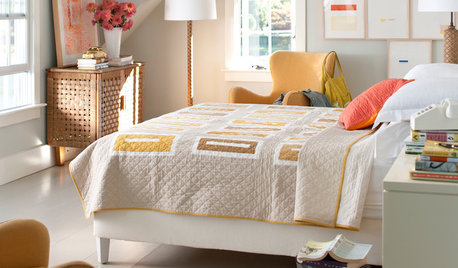
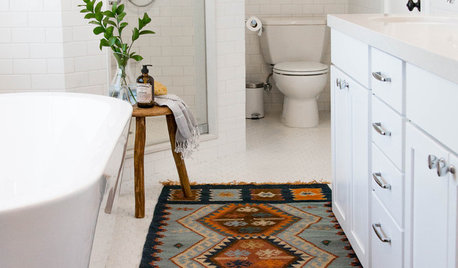
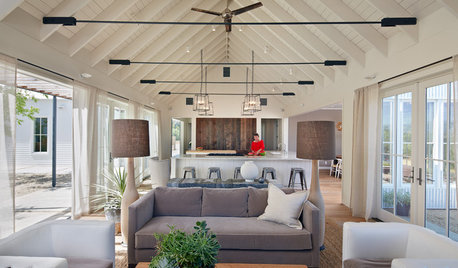
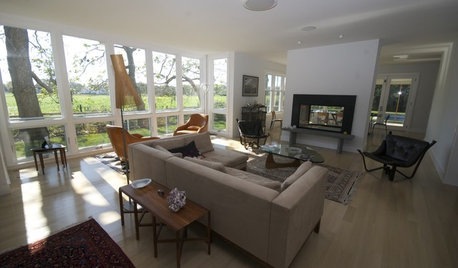
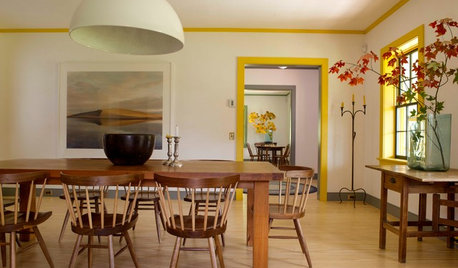
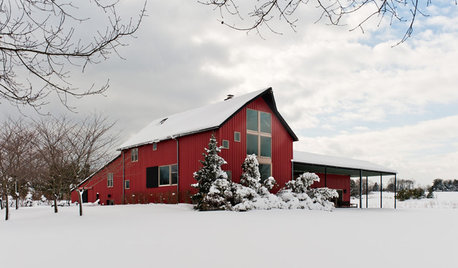
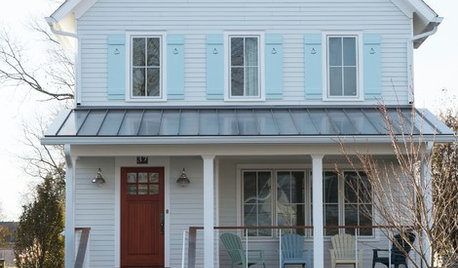
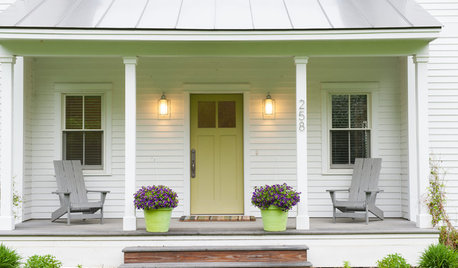
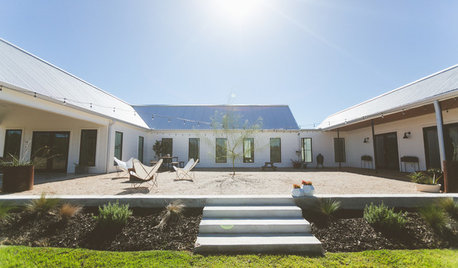
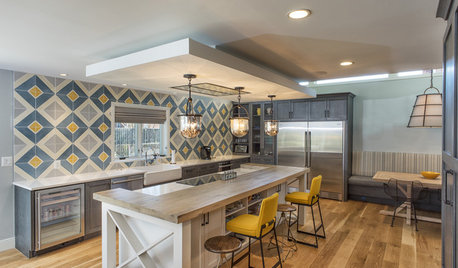




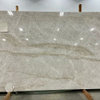
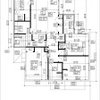
Holly Stockley